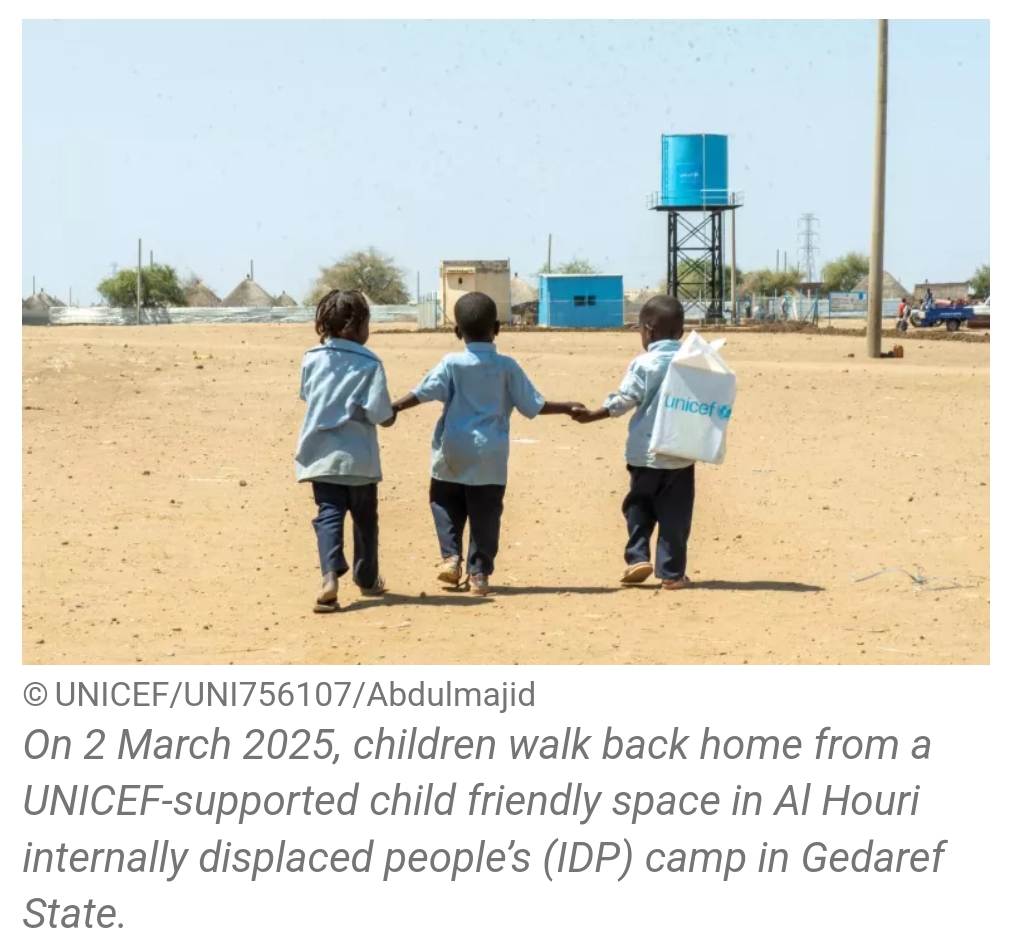Sudan’s Children Face Escalating Crisis as Conflict Enters Third Year: 15 Million Now in Need of Urgent Humanitarian Aid.
Sudan:
As Sudan’s brutal conflict enters its third year, the number of children requiring humanitarian assistance has doubled to over 15 million, marking an unprecedented surge in need amid a worsening crisis of violence, hunger, and disease.
According to a new statement released by UNICEF, Sudan is now facing the largest humanitarian and child displacement crisis in the world. More than 30 million people in the country are in urgent need of aid — half of them children. The number has skyrocketed from 7.8 million in early 2023 to over 15 million in April 2025.
“Two years of violence and displacement have shattered the lives of millions of children across Sudan. Needs continue to outpace humanitarian funding,” said UNICEF Executive Director Catherine Russell. “With the rainy season around the corner, children who are already reeling from malnutrition and disease will be harder to reach.”
A “Perfect Storm” of Threats
The situation in Sudan is deteriorating rapidly as a combination of grave child rights violations, deepening hunger, disease outbreaks, and barriers to aid access create what UNICEF calls a “perfect storm” threatening the lives of millions of children.
UNICEF highlights a staggering 1000% increase in grave violations against children — including killings, maimings, abductions, and attacks on schools and hospitals — since the start of the conflict. Once confined to conflict zones like Darfur and Blue Nile, such incidents are now reported in over half of Sudan’s 18 states, with the highest numbers in the Darfurs, Khartoum, Aljazeera, and South Kordofan.
The agency also warns that famine has already taken hold in five locations, while five more are teetering on the brink and 17 others are at high risk. As the rainy season approaches, seven of these famine-threatened regions also face the danger of flooding — a known trigger for malnutrition and disease. Based on previous trends, up to 462,000 children could suffer from severe acute malnutrition (SAM) between May and October this year.
Meanwhile, the health crisis continues to escalate. In 2024 alone, Sudan reported over 49,000 cases of cholera and 11,000 cases of dengue fever — 60% of which affected mothers and children. These figures are expected to rise during the rainy season due to contaminated water sources, inadequate sanitation, and increased displacement.
Aid Blocked and Funds Drying Up
Despite the massive scale of need, humanitarian access is shrinking due to violence, government restrictions, and bureaucratic delays. In 2024, more than 60% of UNICEF’s aid deliveries were delayed, hampering the agency’s ability to deliver life-saving supplies to vulnerable communities.
Adding to the challenges is a critical funding shortfall. UNICEF is appealing for US$1 billion for its Sudan response in 2025 — the equivalent of just $76 per person for the entire year. However, only $12 million of the required funds have been received this year, with most available resources carried over from 2024.
“Sudan is the biggest humanitarian crisis in the world today, but it is not getting the world’s attention,” said Russell. “We cannot abandon the children of Sudan. We have the expertise and the resolve to scale up our support, but we need access and sustained funding. Most of all, children in Sudan need this horrific conflict to end.”
Lives Still Being Reached — But More Help Needed
Despite the grim outlook, UNICEF and its partners have managed to reach millions. In 2024 alone:
- 2.7 million children and caregivers received psychosocial, education, and protection services.
- Over 9.8 million people accessed safe drinking water.
- 6.7 million children were screened for malnutrition, with 422,000 receiving lifesaving treatment.
Still, with 90% of children out of school and nearly one in three displaced children under the age of five, the scale of the crisis far exceeds the current response.
UNICEF calls on the international community to act swiftly and decisively to prevent further catastrophe — urging increased funding, guaranteed access for aid workers, and, above all, an end to the conflict that has already stolen so much from Sudan’s children.


